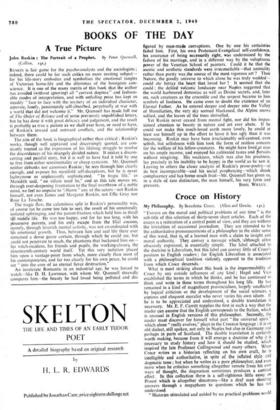BOOKS OF THE DAY
A True Picture
John Ruskin : The Portrait ul a Prophet. By Peter Quennell. (Collins. tss.) RUSKIN is fair game for the psycho-analysts and the sociologists ; indeed, there could be for such critics no more inviting subject— for his life-story embodies and symbolises the emotional tangles of Victorian home-life and the dilemmas of the bourgeois con- science. It is one of the many merits of this book that the author has avoided (without ignoring) all " current dogmas " and fashion- able modes of interpretation, and with unfailing poise has kept us steadily " face to face with the mystery of an individual character, separate, lonely, passionately self-absorbed, perpetually at war with a world that did not welcome it." Mr. Quennell has made full use of The Order of Release and of some previously unpublished letters, but he has done it with great delicacy and judgement, and the result is probably as true a picture as we shall ever have, or need to have, of Ruskin's inward and outward conflicts, and the relationship between them.
The aim of the book is biographical rather than critical ; Ruskin's works, though well appraised and discerningly quoted, are con- stantly treated as the expression of his lifelong struggle to resolve the discordances of his strangely divided nature. It makes a discon- certing and painful story, but it is well to have had it told by one so free from either sentimentality or cheap cynicism. Mr. Quennell neither debunks nor canonises Ruskin ; he sees through him clearly enough, and exposes his manifold self-deceptions, but he is never lachrymose or unpleasantly sophisticated. " In tragic life," as Meredith said, " no villain need bc," and as this tale moves on, through ever-deepening frustration to the final overthrow of a noble mind, we feel no impulse to "..blame " any of the actors—not Ruskin himself, not even James and Margaret Ruskin, not Effie Gray nor Rose La Touche.
The tragic flaw, the calamitous split in Ruskin's personality was, of course (as he came too late to see), the result of his unnaturally isolated upbringing, and the parent-fixation which held him in thrall too middle life. He was too happy, and for far too long, with his possessive parents, and his only escape from the filial cocoon, namely, through feverish mental activity, was not co-ordinated with his emotional growth. Thus, between him and real life there ever remained a dense gauze curtain, through which he could see, but could not penetrate to reach, the phantoms that beckoned him on— his witch-maidens, his friends and pupils, the working-classes, the ninenteenth-century world itself. Yet this very isolation placed him upon a vantage-point from which, more clearly than most of his contemporaries, and far too clearly for his own peace, he could see " into the core of an eternal fierce destruction."
An inveterate Romantic in an industrial age, he was forced to watch—like D. H. Lawrence, with whom Mr. Quennell shrewdly compares him—the beauty he had loved being polluted and dis-
figured by man-made corruptions. One by one his certainties failed him. First, his own Protestant-Evangelical self-confidence, his assurance of being necessarily right, was undermined by the failure of his marriage, and in a different way by the voluptuous power of the Venetian School of painters. Could it be that the ascetic and aesthetic standards were irreconcilable—that animality rather than purity was The source of the most vigorous art ? Then Nature, the goodly universe to which alone he was truly wedded— could she betray the heart that loved her ? It seemed that she could ; the defiled volcanic landscape near Naples suggested that the world harboured demoniac as well as Divine secrets, and, later on, such creatures as the crocodile and the serpent became to him symbols of foulness. He came even to doubt the existence of an Eternal Father. As he entered deeper and deeper into the Valley of Humiliation, the very sky seemed blackened, the Alpine snows sullied, and the leaves of the trees shrivelled.
Yet Ruskin never ceased from mental fight, nor did his impas- sioned attention to beauty in nature and art ever abate. If he could not make this mach-loved earth more lovely, he could at least use himself up in the effort to leave it less ugly than it was becoming. Ruskin may have been irreclaimably self-centred, even selfish, but selfishness with him took the form of restless concern for the welfare of his fellow-creatures. He might have livediat ease on his ample income, and enjoyed his cultivated tastes and Pursuits without misgiving. His weakness, which was also his greatness, lay precisely in his inability to be happy in the world as he saw it. Leaving to others the closer analysis of Ruskin's prose-poetry—at its best incomparable—and his social prophesying—which shook complacency and has borne much fruit—Mr. Quennell has given us, in a style of rare distinction, the man himself, his very form and


































 Previous page
Previous page